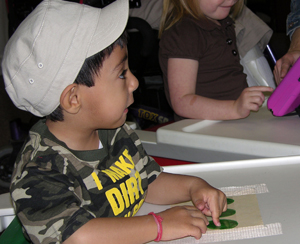 |
Ajay, 3, uses three green dots drawn on a piece of paper to remind him to speak in full sentences instead of single words. Born with femoral facial syndrome, Ajay has attended the Scottish Rite Masons “Rite Care” clinics at the Munroe-Meyer Institute for almost two years. |
Characterized by absent femurs and underdeveloped facial features, femoral facial syndrome can complicate speech development as well as one’s ability to walk.
Ajay only had a vocabulary of about four words when he attended the Scottish Rite speech and language disorder clinic at UNMC’s Munroe-Meyer Institute for the first time almost two years ago. The clinic is designed to increase the expressive communication abilities of preschool age children.
Ajay’s small chin made it difficult for him to enunciate sounds, so he gestured and pointed to compensate for his lack of verbal communication.
“He started out with some speech, but mainly single words and all imitation,” said Korey Stading, a speech therapist who, along with fellow therapist Beth Hughes, teaches the 1 ½ hour long classes held four times a week at MMI. “Now we’re working with him to say three-word sentences or longer.
Three green dots drawn on a piece of paper have helped.
“We use the green dots just as a general pacing strategy to help children with speech and language disorders, instead of telling them to slow down,” Stading said. “With the visual cue and physically touching the dots, Ajay has made a huge amount of progress, and his speech has cleared up a lot.”
Through songs, books, art and interaction at the Rite Care clinic, Ajay can now say more than 100 words, many of which he initiates.
“Before his words were limited, but now, he’ll surprise you. He’s really come a long way,” said his mother, Joy. “Korey and Beth are the best teachers. They encourage children to say the words in context and they wait very patiently for them to do it.”
One of the higher functioning children in the clinic, Ajay sits in his desk chair, legs sticking straight out because of his disorder, and verbally answers most of the prompted speech questions posed by the instructors. Others use sign language and speech generating devices, programmed with picture buttons that, when pressed, speak to respond.
Some of the children are silent because of disorders such as Apraxia, a motor planning disorder. Others have more encompassing disabilities, such as Down syndrome, autism or cerebral palsy, all of which can complicate speech.
Through the free Rite Care clinic, parents have opportunities to carry on conversations with their children and to hear them say those three magical words for the first time: I love you.
Some families wouldn’t be able to afford the speech services without the Scottish Rite Masons’ financial support, Stading said, as insurance companies will not always cover the cost.
|
Joy can attest to that. Ajay not only takes individual speech therapy in addition to attending the Scottish Rite clinic, but also has had to undergo several surgeries on his feet. That said, she is very grateful for the speech services made possible by the Scottish Rite Masons.
“It’s an awesome program,” she said. “God Bless the Scottish Rite Masons for supporting it.”
Unintentionally, the speech sessions for the children have become therapy sessions for their mothers as well. The observation room behind the two-way mirror is where their support group meets.
“We have every right to leave the room, but we love the respite we get,” Joy said. “You meet moms with difficult and different situations and they teach you so much. Kids are OK; kids are strong. Moms are not, but this helps make moms strong.
“And we don’t always talk about the kids either,” she added. “I try to make them laugh.”
Joy is definitely the comedian of the bunch. During a recent session, the other moms chuckled at her self-deprecating humor as they exchanged addresses, ate chocolates and drank coffee. Their conversation ranged from shopping to surgeries to swim lessons.
At the end of the session, after the goodbye song, the children rushed back to their parents, happier than when they arrived. Ajay walked up to his mom and gave her a hug.
That’s right. Last April, Ajay defied the odds and took his first steps all by himself.
“It was truly a miracle,” Joy recalled. “You wish and pray for things, but when they happen, it’s a different story.
“Doctors told us he would never walk, so we had no hope that he would.”
But Ajay knows no bounds. He makes the most of his disability that affects less than 200,000 people in the United States population. His mom calls him a mischievous “chick magnet” and said he exudes constant happiness.
“He’s taught me a lot — he’s very strong,” she said. “His size is small but his personality is so big.”